Found 45 results for Ten Commandments
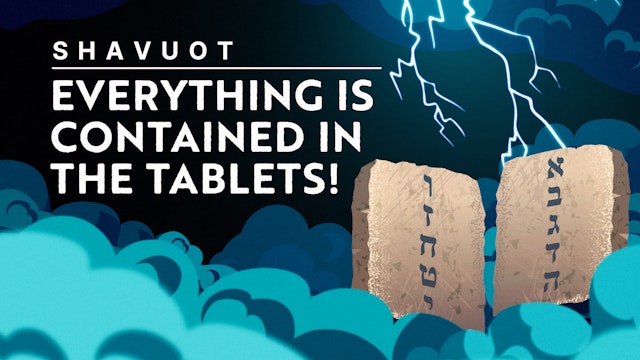
What Do The Ten Commandments Mean?
Why are the Ten Commandments important to Judaism? Do you ever wonder what’s so special about the Ten Commandments? Why were they singled out to be part of God’s momentous speech at Mount Sinai? Why do we make such a big deal about reading them on Shavuot, or putting them up in our shuls and on our courthouses? Why do we treat them as if they are somehow more special, or more fundamental, than all of the other parts of the Torah? The answer that’s often given is that they are more fundamental than the other parts of the Torah because they somehow represent the core ideas of the Torah. That every law in the Torah can be somehow reduced to one of these Ten Commandments. It’s as if these are the ten most essential concepts that God is trying to convey to us. So go with that theory for a second, and now ask yourself this: What if we told you that the Ten Commandments, these ten essential concepts, do express a fundamental Torah truth, but they aren’t actually ten? That the “ten commandments” are actually one single idea – the idea, the big, central message that God wanted the Israelites to hear, the one message that the whole Torah boils down to? The most core truth at the heart of all of Judaism, as it were? Don't you want to know: What's the one big idea?? Take a look at this course, in which Rabbi Fohrman approaches the Ten Commandments almost as an archaeologist, identifying multiple hidden layers that are baked into the text, peeling them back one by one, and revealing the single core truth that lies beneath them all. Discover other great Shavuot videos at Aleph Beta, including ‘The Book of Ruth Explained’, ‘The Scandalous Backstory of Boaz & Ruth’, and ‘Why Do We Celebrate Shavuot Laws’

Mishpatim: The Ten Commandments… The Sequel?
This week, Imu guides Rabbi Fohrman into the myriad of laws of Mishpatim. He points out some subtle connections – both in theme, and in language – between these laws and the Ten Commandments, which we just heard last week, and asks, why? Why is there a replay of the Ten Commandments?
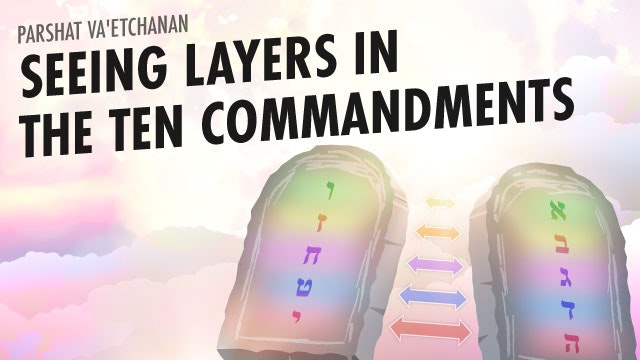
Seeing Layers In The Ten Commandments
How do the Ten Commandments still apply today? After all, most of them are not difficult to observe – “don’t steal… don’t kill” – these are not laws you need to think about daily. So do we actively apply the Ten Commandments in our lives – or is there a deeper theme that we're missing? Join Rabbi Fohrman as he re-examines and simplifies the Ten Commandments to uncover the main themes. The Ten Commandments have a breadth of meaning hidden in its words that indicate an enormous amount about the way we should live our lives today. By simplifying the layers, we can begin to uncover what is the central idea that lies at the heart of all the Ten Commandments – a theme that has an incredible influence on how we should manage all of our relationships.
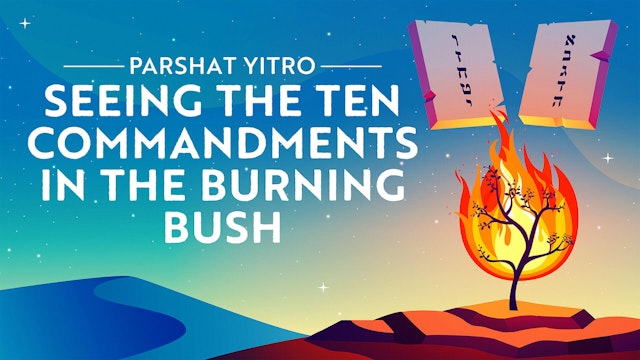
Seeing The Ten Commandments In The Burning Bush
In Parshat Yitro, we read about Moses receiving the Ten Commandments. But there’s something very unique about the text in this section – it’s strikingly similar to an earlier story, namely, Moses and the Burning Bush. Is there a parallel that’s meant to be drawn between the stories of Moses, the Ten Commandments, and the Burning Bush? Join Rabbi Fohrman as he re-examines both texts and learns how the Burning Bush may actually serve as a template for the Ten Commandments. Through this comparison, we start to see a deeper spiritual meaning behind the story of the burning bush.
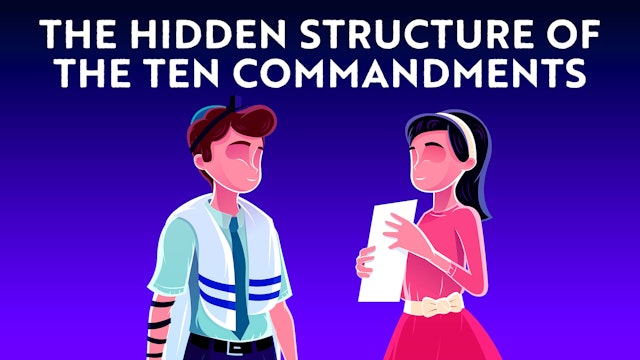
The Hidden Structure of the Ten Commandments
↳ part 3 of 6 of the series "Bar And Bat Mitzvah Preparation Course"
The Ten Commandments is one of the most well known and revered documents in the world. But on the surface, it seems kind of bland and not too earth shattering. In this video, we’re going to dig beneath the surface of this text to uncover layers of meaning that you never imagined were there. Want to get more out of this course? Click here for the full experience, including activities and guides to help you truly integrate this material into your Bar/Bat Mitzvah experience.

Did God Really Need Ten Plagues?
Ten colorful and unique plagues... was that really so necessary? Or was there a deeper theological significance behind why God sent all ten plagues to Egypt? In this week's video, Rabbi Fohrman explores the final plagues and argues that God played off of Pharaoh's ego to show Pharaoh, the people of Egypt and the people of Israel that only God is all-powerful. Through this explanation, we uncover the significance and meaning of why God needed to send all ten plagues – and nothing less.

What's With The Ten Plagues?
This week, Rabbi Fohrman and Imu tackle Parshat Va'era and ask: are the 10 plagues just arbitrary, or is there a deeper symbolic explanation? Do the 10 plagues mean something real, to the Israelites, the Egyptians, and to us, today?
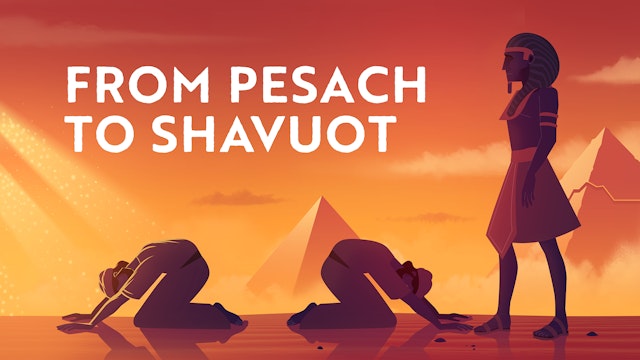
The Exodus From Egypt In The Bible
We don't generally connect the origins of the 10 Commandments to Passover. Instead, we usually celebrate the great miracles that God performed for the Israelites, namely, taking them out of Egypt. But isn’t it strange that right after the Israelites were freed, God enforced the laws of the Ten Commandments without warning? Sure, God took them out of slavery, but wouldn’t it have been nice to at least mention the laws before the Israelites left Egypt? What is the hidden connection between Pesach and the Ten Commandments? Rabbi Fohrman argues it's an important theme throughout the Exodus from Egypt that highlights our unique relationship with God. Join Rabbi Fohrman as he explores the roots of the Ten Commandments in the Burning Bush story – the original commandments story – and never read the Exodus from Egypt the same way again. Discover other great videos at Aleph Beta, including ‘What Is Hallel?’, ‘How To Read The Haggadah’, and ‘The Fast of The Firstborn’.

What's So Special About The Tablets?
↳ part 1 of 2 of the series "What's So Special About The Tablets?"
We learn in Parshat Terumah that the tablets of the 10 Commandments have a central place in the mishkan, the Tabernacle. But why? A clue might come from the Torah's constant use of the word "edut," testimony, and "moed," a place of meeting. Come join Rabbi Fohrman and Imu as they puzzle it out.
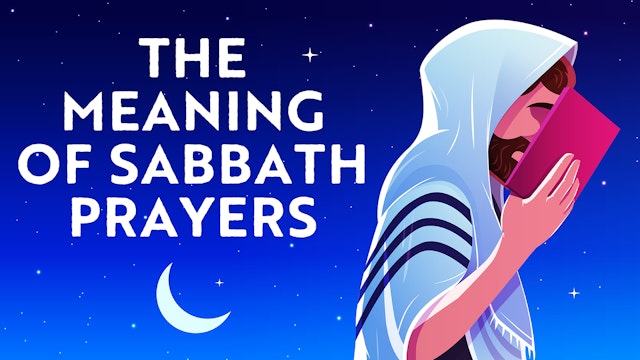
Sabbath Afternoon: The Gift of Rest
↳ part 3 of 3 of the series "The Meaning Of Sabbath Prayers"
The Sabbath prayers include special additions for each of the three times of day - Friday night, Saturday morning, and Saturday afternoon. Each prayer includes a rabbinic text that either appears in tandem with a Biblical text about Shabbat, or stands alone to describe the Sabbath. Why did the rabbis choose to include these specific Biblical texts, at these times of the Sabbath? How can we make sense of the liturgical additions that accompany them? In this three part series, Rabbi Fohrman shows how each of these prayers are in fact offering a rabbinic interpretation on the Biblical text, and how each one reveals a deep secret about the nature of Sabbath itself.

Birkat Hamazon: The Context for The Command to Thank God
The daily text that is used for the Grace After Meals originates from a verse in Deuteronomy, - “v’achalta v’savata uverachta et Hashem Elokecha al ha’aretz hatovah asher natan lach.” You should eat, be full or satisfied, and bless God for the good land that He gave you. Read on its own, it seems pretty straightforward. We eat and then we give thanks. However, the command to thank God is just one line out of a larger speech Moses is giving in this chapter. And if you take a look at that speech, it’s seemingly pretty troubling. By taking a closer look at these words in context you can learn more deeply what it means to build a relationship with God, and how to truly give thanks.
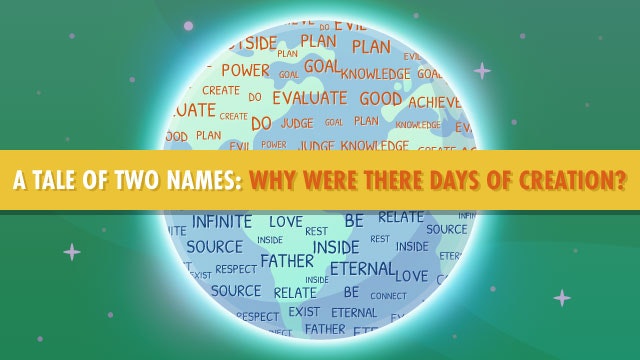
Why Were There Days of Creation? Week 1
↳ part 1 of 3 of the series "A Tale of Two Names: Why Were There Days of Creation?"
Why were there six days of creation, at all? It seems like such a quaint notion, the universe being created in 6 days. But you didn't have to be a rocket scientist from the 21st century to realize that an Elenterprise like the universe might take a little more than the 6 days to construct. And you likewise don't have to be the world's most sophisticated scientist to realize that it's pretty hard to get days, in the traditional sense, without the sun and the solar system - which, inconveniently enough, only show up on day 4. So, what's with the days? Why does the Torah insist on them? In this course, we'll take a close look at the text of the Torah, with an eye toward solving these mysteries. For our latest, most expansive and refined material on this subject, be sure to watch our fully animate course Making Sense of Morning Prayers. This lecture is part 2 of a 3 part series. For the first series on A Tale of Two Names, be sure to listen to A Tale of Two Names: Elokim and YHVH. For the last in the lecture series, listen to A Tale of Two Names: From The Garden To The Flood.
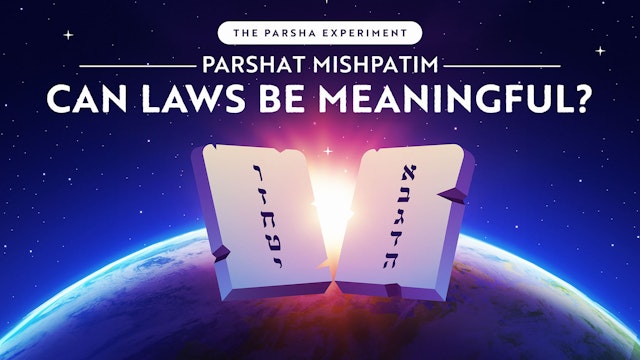
Can Laws Be Meaningful?
In this week's Parsha (Exodus 21:1–24:18) we are in the midst of two of the most well known and epic stories in the entire Tanach: Revelation at Sinai and the Sin of the Golden Calf. The Israelites experience their highest high and their lowest low, all within the same few verses. However, smack in the middle of these two legendary episodes, we are forced to read law after law after law. How can we understand these moral laws as meaningful principles of Jewish life, and not just a long list of rules we must live by? Join us this week as we explore these biblical laws and find out how they add layers of complexity to the epic highs and lows of the Revelation story. In this video, we uncover how laws are not just moral principles to which we must adhere, but a hidden guide on how to infuse spirituality into our daily lives. Laws give us the actionable items through which we can spread the values of Judaism, just as God instructed Abraham thousands of years ago. Join Imu and Ramie as they demonstrate how these laws are an embodiment of the Jewish principles of life. Dig Deeper: Learn more about the Ten Commandments Explore more laws in Mishpatim and other Jewish Laws Join our growing community and support what we do
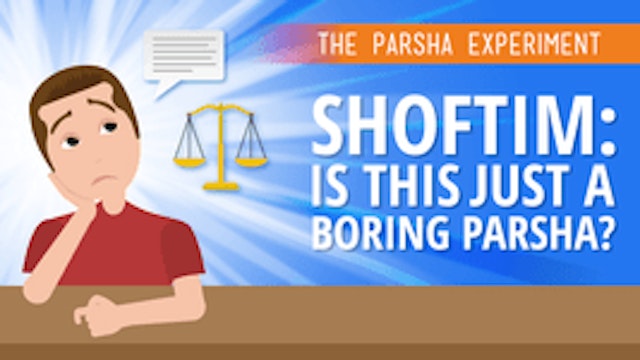
Shoftim: Is This Just A Boring Parsha?
If the entire book of Deuteronomy is supposed to be Moshe's rousing speech before the nation enters Israel, how can we understand the mundane text of Parshat Shoftim? Instead of inspiration, we hear law after law of seemingly trivial matters – witnesses, legalities, land boundaries. What is this long list of laws doing in the middle of this book, that is supposedly Moshe’s inspirational speech?
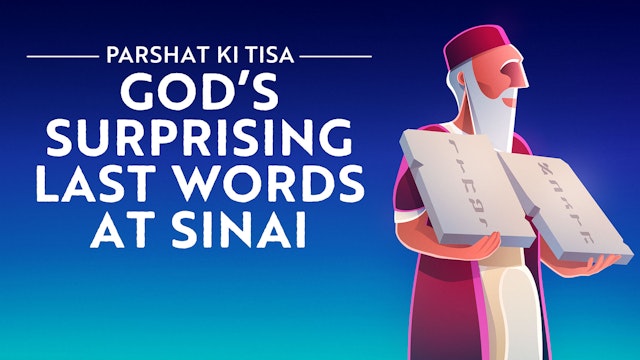
God's Surprising Last Words At Sinai
The very last words God tells to Moses as he's ready to leave Mount Sinai are about the Sabbath. Why? Moses has already heard about Shabbat – he's gotten and given those laws. And its not even like God is giving him a long detailed diatribe on the Sabbath either – there are six verses, and that's it. God has just spent the last forty days on Sinai talking about the tabernacle and THOSE laws... Why was it so important that the Sabbath be the last thing He spoke about to Moses? The rabbis pick up on this question, and give their explanation in the introduction to the Sabbath morning prayers. But looking at the rabbis' explanation, we are left with more questions! Join Rabbi Fohrman as he dives deep into this prayer, and understands the rabbis' answer to God's surprising last words to Moses on Mount Sinai.